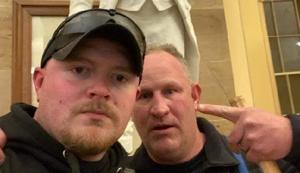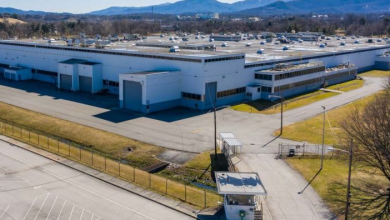Is 8 years in prison enough for this Jan. 6 insurrectionist?

If there’s one federal agency you don’t want throwing the book at you, it’s the U.S. Department of Justice. Percentage-wise, the DOJ’s criminal-court conviction rate is up in the high 90s. And right now it’s aiming a big book at Thomas “T.J.” Robertson, a former Rocky Mount Police sergeant.
He’s one of a handful of Western Virginians charged or convicted with participating in the Jan. 6 insurrection at the U.S. Capitol.
In April, a federal jury convicted Robertson of six charges: obstructing a special session of Congress; impeding police; entering a restricted area; two counts of disorderly conduct; and of destroying his cellphone after Jan. 6, which held incriminating evidence against him.
Federal prosecutors last week asked a judge to put Robertson away for eight years. That would be the longest sentence imposed on any Jan. 6 defendant so far. (Some of them have already been sentenced to house arrest or months or years in prison. Others are awaiting trial on even more serious sedition charges that could elicit lengthier terms.)
Robertson’s attorneys are asking for a sentence of 15 months. If that’s what judge gives him, he’ll soon be released because Robertson’s already served 13 months, without bond, in jail while awaiting trial.
The big question is, how much time does Robertson deserve? For that, we need to look at Robertson, and his actions both before and after the attempted coup.
First, Robertson was a police officer for 16 years. He served the Rocky Mount department honorably from 2001 to 2010 and from 2014 to 2021. He also served in the U.S. Army in Iraq, and had a stint in Afghanistan as a private military contractor.
The town of Rocky Mount fired Robertson and a subordinate shortly after the insurrection. (The subordinate, former officer Jacob Fracker, pleaded guilty and testified against Robertson. Fracker’s also awaiting sentencing.)
Does Robertson get special sentencing consideration in light of his vocation and military background? He should — in the form of a heavier sentence.
As a cop, he can’t pretend he’s ignorant of the law, or that he doesn’t understand the concept of trespassing or breaching a closed government building. Knowingly violating the law is even worse than unintentionally breaking it — and even in the latter case, ignorance of the law is a rotten excuse.
Testimony at his trial showed Robertson recruited Fracker and another friend to go to Washington that day. He was the instigator of their trip.
It’s logical to conclude Robertson anticipated uproar in the nation’s capital — because he packed gas masks and a big stick to take with him. Those are what some folks might call “evidence of premeditation.”
Second, there’s a little matter of some alarming social media posts Robertson made shortly after Jan. 6. In one, Robertson wrote he was “f—ing proud” he and Fracker entered the U.S. Capitol Crypt that day, and posed for a picture there with Fracker giving a one-finger salute to the camera. To emphasize that pride, Robertson also posted this: “CNN and the Left are just mad because we actually attacked the government who is the problem and not some random small business … The right IN ONE DAY took the the f——— Capitol. Keep poking us.”
Those words hardly sound like honest reflections of someone who’s ashamed of his actions, eh? Instead, they sound like a challenge.
Third, there’s the matter of crimes Robertson committed after Jan. 6. Both he and Fracker destroyed their cellphones after the insurrection, to try to cover up their actions. That’s potent evidence they possessed a consciousness of guilt.
Fourth is the matter of Robertson’s bail. After their arrests for Jan. 6, Robertson and Fracker were freed on bond. One of the bond conditions a judge set was neither was allowed to possess firearms pending trial. Robertson failed that test twice.
While he was awaiting trial, federal agents raided Robertson’s home and seized a rifle from his home in spite of the judge’s warning. They also found a partially constructed booby trap. Robertson said the booby trap was something he used in training other police officers; he said the gun was his son’s and he was unaware it was in the house.
Following those seizures, the judge let Robertson remain free, but warned him even more emphatically he could not possess guns. What did Robertson do next?
He ordered 35 military rifles online. He had them mailed to, and stashed with, a federal firearms dealer. When the feds found out about those purchases, they freaked out and revoked his bond in July 2021. It’s understandable, given the prior court warnings.
That’s why Robertson has been in jail for 13 months — because he twice ignored a judge’s admonition not to possess guns while he was facing federal charges for the Jan. 6 insurrection.
Shortly before that bond revocation hearing, Robertson posted again in an online gun forum. Though a bit more reflective, he still seemed proud of his actions.
“I have learned that if you peacefully protest that you will be arrested, fired, be put on a no fly list, have your name smeared and address released by the FBI so every loon in the U.S. can send you hate mail,” Robertson wrote the post.
“I have learned very well that if you dip your toe into the Rubicon … cross it. Cross it hard and violent [sic] and play for all the marbles.”
Those words tend to cast Robertson’s purchase of those 35 firearms in an unfavorable light. They make him sound unrepentant and dangerous — and almost as if he was planning something bigger and badder once he got free.
It’s enough to leave you wondering whether eight years in prison is enough.




